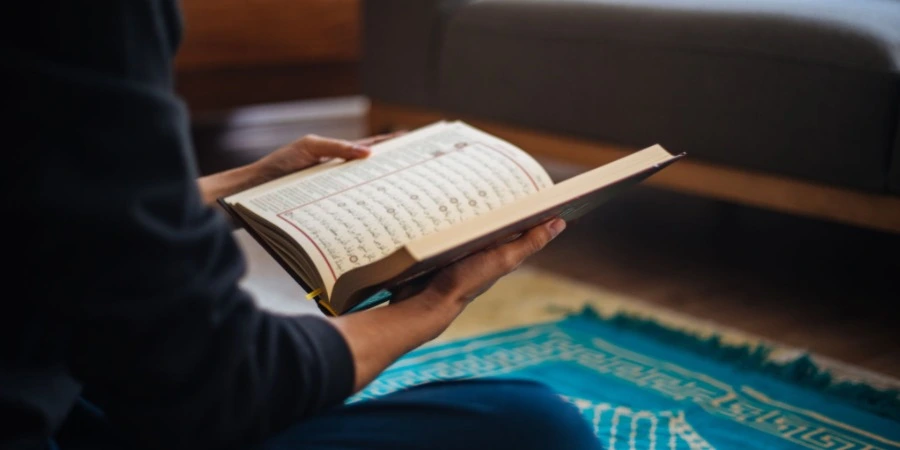These two verses (2:285 and 2:286) arrived in Madinah and are often described as among the most powerful in the Qur’an for protection and mercy. They were revealed at a moment when the Muslim community was consolidating faith, obedience and accountability. Scholars note that these verses were mentioned in authentic ahādith as sufficient (kifāyah) for the one who recites them at night.
They summarise core themes: belief in Allah and His messengers, obedience, accountability, divine mercy, and the believer’s plea for forgiveness and help. These themes often emerge in Quran memorization courses, where students are encouraged not only to memorize but also to reflect deeply on meanings.
Ayah 285 – Meaning Explained (Simple Tafsir)
Core Message of Belief (Imān)
In verse 2:285 the message centres on faith: the Messenger believes in what is sent to him by his Lord, and so do the believers. Everyone believes in Allah, His angels, His Books, and His Messengers. It emphasises no distinction between the messengers and the believer’s statement: “We hear and we obey.”
This verse also sets up humility and submission before Allah. True faith isn’t just words. It’s living obedience. It reminds us of accountability: each person will earn what they strive for. In your life, that means faith isn’t passive. It’s active.
This teaching is often emphasized in Quran recitation classes, where students learn not only to recite but to internalize obedience through the rhythms of the Qur’an.
Ayah 286 – Meaning Explained (Simple Tafsir)
Allah’s Mercy & Divine Ease
Verse 2:286 shifts focus toward mercy, responsibility and human capacity. “Allah does not burden a soul beyond its capacity” offers a profound lesson on resilience and comfort. Your tests aren’t random and they match your ability. The verse continues: for what one earns, what one bears; “Our Lord, do not impose blame upon us if we forget or err…”
This is one of the most complete duʿā (supplications) in the Qur’an: asking for pardon, forgiveness, mercy, strength and victory. In everyday life, it means you are seen, your efforts count. And you always have recourse in duʿā.
Many online Islamic courses, including those covering Surah Alam Nashrah, pair this verse with others that focus on ease and divine support, offering holistic spiritual training.
Authentic Hadith on the Virtue of the Last Two Ayat
Why These Verses Are Spiritually Unique
The virtues of these two ayāt are supported by strong traditions: for example, the Prophet ﷺ said: “Whoever recites the last two verses of Surah Al‑Baqarah at night, they will suffice him.” This hadith is agreed upon in both Sahīh al‑Bukhārī and Sahīh Muslim.
Hudhayfah reported: The Prophet, peace and blessings be upon him, said, “I have been given these last two verses of Surat al-Baqarah from the treasures beneath the Throne. No prophet has been given the likes of them before me.”
Source: Musnad Aḥmad 23251. Source of information: Abu Amina Elias These statements underline the spiritual magnitude: recitation communicates both protection and reward, not just routine. For you, it means engaging with these verses isn’t just following a habit. It’s stepping into a deep connection and a tradition of profound blessing.
For those studying Surah Waqiah in parallel, the thematic overlap of reliance, provision, and divine control creates a well-rounded nightly recitation routine.
Benefits of Reciting the Last Two Ayat (Backed by Quran & Sunnah)
Protection & Kifayah
When you recite these verses, especially at night, you are doing more than reading words. You activate protection, calm and sufficiency. These verses act as a shield against evil whispers, spiritual distress and fear. They strengthen trust in Allah (tawakkul) and deepen your relationship with Him by reminding you of His mercy and oversight.
Powerful Dua for Forgiveness
Embedded in 2:286 is a comprehensive supplication:
“Our Lord! Do not punish us if we forget or make a mistake. Our Lord! Do not place a burden on us like the one you placed on those before us. Our Lord! Do not burden us with what we cannot bear. Pardon us, forgive us, and have mercy on us. You are our ˹only˺ Guardian. So grant us victory over the disbelieving people.”
This covers daily believer needs: weakness, forgetfulness, accountability, divine help. It teaches us to seek Allah’s help consciously and persistently. In your daily life, this means you have a ready‑made duʿā that addresses the spiritual, emotional and physical dimensions of existence.
Why Every Muslim Should Recite These Verses
In these two verses you find iman (faith), mercy, protection, forgiveness and hope. All in concise, potent form. They serve your spiritual security and emotional calm. They are particularly suited for families, new learners and anyone seeking a powerful yet accessible nightly act. Incorporating them doesn’t demand hours. It demands heart. Whether you’re a beginner in Quran recitation classes or advancing in deeper tafsir, these verses are foundational. Make them part of your night routine, teach them, live them. The reward is real, the impact lasting.




